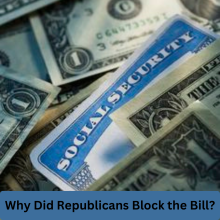
In recent years, Social Security has been a cornerstone of financial stability for millions of Americans, particularly retirees. While many Republicans have voiced support for protecting or even expanding Social Security benefits, a surprising twist has unfolded in the House of Representatives. A bill designed to increase benefits for retirees—especially those impacted by the Windfall Elimination Provision (WEP) and Government Pension Offset (GPO)—was introduced with broad bipartisan support. However, a tactical move by the Freedom Caucus, led by Rep. Andy Harris, effectively killed the bill. Let’s dive into what happened, the implications of the bill, and why Republicans decided to break protocol to block it.
The Social Security Expansion Bill: What Was It About?
The bill introduced by Representatives Garret Graves (R-LA) and Abigail Spanberger (D-VA) aimed to make significant changes to Social Security by repealing two provisions that reduce benefits for certain retirees: Windfall Elimination Provision (WEP) and Government Pension Offset (GPO). These provisions often cut Social Security benefits for workers who have earned pensions from jobs that weren’t covered by Social Security, like teachers, police officers, and public service workers.
If passed, the bill would have allowed these retirees to receive full benefits, significantly increasing their monthly payments. The bill garnered wide support across party lines and was expected to provide much-needed relief to retirees who had been financially impacted by these provisions.
Effects of WEP and GPO on Retirees
The WEP and GPO are provisions designed to reduce Social Security benefits for individuals who receive pensions from employment not covered by Social Security. While these rules aim to prevent “double-dipping” (i.e., receiving both Social Security and full pension benefits), they have left many retirees in a tough spot.
For example, a retired teacher who worked in a state system that doesn’t contribute to Social Security might see their Social Security benefits reduced by the WEP. Similarly, the GPO can reduce benefits for public employees who receive pensions from state or local governments but have worked in positions where Social Security was not paid.
These provisions affect a broad swath of Americans, especially those in public service roles like teachers, police officers, and firefighters. Many of these retirees have low or fixed pensions and are depending on their Social Security to maintain their standard of living.
The Bipartisan Support Behind the Bill
Despite being introduced by lawmakers from different parties—Rep. Garret Graves, a Republican, and Rep. Abigail Spanberger, a Democrat—the bill had broad bipartisan support. This wide-ranging support indicated a rare moment of agreement between both sides of the aisle over the importance of improving Social Security for those impacted by WEP and GPO.
Graves and Spanberger worked hard to get 218 signatures — enough to get the bill to the House floor for a vote. With so much momentum, it seemed likely that the bill would pass, benefiting millions of American retirees. However, the unexpected interference from the Freedom Caucus quickly put a stop to the bill’s progress.
What Made the Bill So Promising?
The bill was a beacon of hope for those affected by WEP and GPO, and its support across party lines indicated a shared understanding of its importance. For retirees, particularly those with limited pensions or other retirement savings, this bill would have made a world of difference. With the backing of 218 signatures, it seemed poised to pass easily, promising relief for those in dire need of it.
However, despite this support, the bill’s fate was sealed when the Freedom Caucus intervened.
The Freedom Caucus Blocks the Bill: How Did It Happen?
In an unexpected move, the Freedom Caucus, a faction of conservative Republicans, used procedural tactics to block the bill’s passage. The group, led by Rep. Andy Harris, effectively killed the bill by laying it “on the table,” meaning it was set aside without a formal vote. This move broke with legislative protocol, and as a result, the bill became dormant—at least for the time being.
Rep. Harris’s action was seen as a strategic maneuver to halt the bill, which would have cost an estimated $196 billion over the next decade.
The Role of Andy Harris in the Blockage
Rep. Andy Harris, Chairman of the Freedom Caucus, played a key role in blocking the bill. Harris’s request for unanimous consent to lay the bill on the table effectively halted its progress without a formal vote. This move surprised many lawmakers, especially given the wide bipartisan support for the bill.
The tactic used by Harris was unusual and broke from traditional legislative protocol, making the bill dormant and preventing further discussion or voting. Harris’s action has drawn criticism from both Democrats and Republicans who believe the bill would have provided much-needed support to retirees.
Why Did Republicans Block the Bill?
The official reasoning behind blocking the bill was financial: the bill was projected to cost $196 billion over the next 10 years, a significant amount for a government program already facing a funding shortfall. Social Security is projected to face insolvency by 2035, and concerns about adding more financial strain were likely a motivating factor in the decision to block the bill.
However, some political observers believe the move was also strategically timed to align with the Republican Party’s broader agenda. With a potential shift in political control in Congress on the horizon, blocking the bill may have been a way to prevent any significant changes before the upcoming elections.
Financial Concerns and the $196 Billion Price Tag
The projected cost of the bill—$196 billion over 10 years—was cited as a major reason for blocking it. While the bill would have provided crucial financial relief to retirees impacted by WEP and GPO, its cost would have added to the already significant financial burden on Social Security.
The Social Security Administration is already facing a funding shortfall, with projections showing that benefits could be reduced as early as 2035. Given the already strained financial outlook for Social Security, some Republicans argued that this bill would exacerbate the problem.
The Political Strategy Behind Blocking the Bill
Beyond financial concerns, it’s also possible that the move to block the bill was part of a broader political strategy. Some analysts suggest that Republicans may have delayed any changes to Social Security until they could secure a majority in the House or Senate, allowing them to shape future legislation according to their priorities.
Delay Tactics: Is This About Control?
It’s no secret that Social Security reform is a contentious issue in American politics, and many believe the timing of the bill’s blockage was a deliberate move to maintain political control. By blocking the bill now, Republicans could delay changes to Social Security until they have more leverage in future negotiations.
Who Would Have Benefited from the Bill?
The bill would have provided relief to retirees who rely heavily on Social Security and are currently being penalized by WEP and GPO. Many of these individuals are teachers, police officers, firefighters, and other public service workers who have worked hard for decades but are now facing reduced benefits.
The bill would have particularly benefited individuals who have pensions from non-Social Security-covered jobs, as it would have allowed them to receive the full Social Security benefits they are entitled to.
Real-Life Impact: Stories of Affected Retirees
For many retirees, the reductions caused by WEP and GPO are substantial. Some retirees lose thousands of dollars per year, which can mean the difference between financial security and struggle. For teachers and public service workers who dedicated their careers to helping their communities, the bill’s passage would have been a lifeline.
Also read: Macaulay Culkin Joins Fallout: A Crazy Role Revealed
What Happens Now? Could a New Bill Be Introduced?
Despite the setback, there is still hope that the issue of WEP and GPO reform will be addressed in the future. Lawmakers could introduce a new bill, or perhaps push for a discharge petition to force a vote on the existing bill.
Legislative Options: Discharge Petition or New Bill?
To move forward, lawmakers could either attempt to reintroduce the bill with similar guidelines or push for a discharge petition. A discharge petition allows the House to bypass the committee process and bring a bill directly to the floor for a vote, bypassing the usual roadblocks.
The Future of Social Security and Its Challenges
Social Security is facing significant challenges in the coming years. With the trust fund projected to run dry by 2035, reform will be essential to ensure that the program remains sustainable. The fight over WEP and GPO is just one piece of the puzzle, but it highlights the ongoing challenges surrounding Social Security.
Public Perception and Political Pressure
Public opinion will likely play a major role in future Social Security reform efforts. With millions of retirees depending on the program, any attempts to change or cut benefits will be closely scrutinized by the public, adding political pressure on lawmakers to act.
Also read: Historic HBCU Fire: Knoxville College’s Elnathan Hall Lost
Conclusion
The recent blockage of the Social Security benefits expansion bill highlights the complexities of reforming Social Security and the political maneuvering involved. While the bill was widely supported and would have helped millions of retirees, its fate was sealed when the Freedom Caucus intervened. As Social Security faces increasing financial challenges, the need for comprehensive reform remains critical, but the path forward remains uncertain.
FAQs
-
What is the Windfall Elimination Provision (WEP)?
- The WEP reduces Social Security benefits for individuals who also receive a pension from a job not covered by Social Security.
-
How does the Government Pension Offset (GPO) affect retirees?
- The GPO reduces Social Security benefits for individuals who receive pensions from government jobs not covered by Social Security.
-
Why was the Social Security bill blocked?
- The bill was blocked by the Freedom Caucus over concerns about its cost, as well as potential political motivations.
-
How would the bill have helped retirees?
- The bill would have allowed retirees affected by WEP and GPO to receive full Social Security benefits, which would have increased their monthly payments.
-
Can the bill be revived in the future?
- Yes, lawmakers could attempt to reintroduce a similar bill or push for a discharge petition to force a vote.

